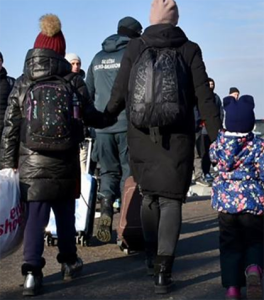Europe opens it arms to Ukrainians
More than half a million Ukrainians have fled their homeland since Russian forces invaded, according to the UN’s refugee agency UNHCR.
And some estimates say the number could rise to seven million.
People have walked many kilometres through the freezing nights while others fled by train, car or bus, forming lines several kilometres long at border crossings with neighbouring countries, including Poland, Moldova, Hungary, Romania and Slovakia.
 The UNHCR says that the arrivals are predominantly women, children and the elderly.
The UNHCR says that the arrivals are predominantly women, children and the elderly.
The UN High Commissioner for Refugees Filippo Grandi said more than 500,000 people had left Ukraine in the first four days of the Russian invasion. He said more than 46,000 refugees had arrived in Poland in just 15 hours.
There were queues of 14 kilometres at the Poland-Ukraine border and waiting times of 40 hours, a UNHCR statement said.
The agency expects up to four million Ukrainians could flee if the situation deteriorates further.
Russia’s attack on its Western neighbour has ignited a massive outpouring of support for the fleeing Ukrainians.
This included an unconditional welcome from Poland and Hungary, both of which have not wanted to accept refugees fleeing conflict and poverty in the Middle East and Africa.
Poland declared its border open to fleeing Ukrainians – even those without official documents – and dropped its requirement to show a negative COVID-19 test.
Hungarian Prime Minister Viktor Orbán, a vehement anti-migrant politician, travelled to the border town of Beregsurány, where he said Hungary was accepting all citizens and legal residents of Ukraine.
“We’re letting everyone in,” Mr Orbán said.
UNHCR said that ordinary people were also opening their homes to refugees and volunteering at welcome centres. In Poland, a Facebook page was set up to offer people rides in private cars from the border and other help.
Other countries across Europe have also announced they will help or begin to accept refugees from Ukraine.
Serbia’s Minister of Foreign Affairs has said the country is ready to accept refugees as well as send humanitarian and medical aid to Ukraine.
Serbia has not introduced sanctions against Russia, but says it “supports the territorial integrity of Ukraine”.
Albania and Croatia, have also confirmed they are ready to receive Ukrainian refugees fleeing war.
People in Bosnia and Herzegovina are offering to host refugees at their homes on social media.
Meanwhile, European Union interior ministers are trying to forge a common response to the developing refugee crisis as thousands of Ukrainians continue to flee.
At a recent meeting in Brussels, proposals on humanitarian aid, migration, cyber attacks and crisis management are being discussed.
Top of the agenda is the idea of an “adapted temporary protection device” to respond to the current crisis, which could see Ukrainian refugees settled, at least temporarily, across EU member nations.
A similar device was introduced in the wake of the Yugoslav wars in the 1990s, but which has never been used.
There has traditionally been reluctance by some EU members to trigger the mechanism because it is seen as a possible step toward a mandatory relocation system.












